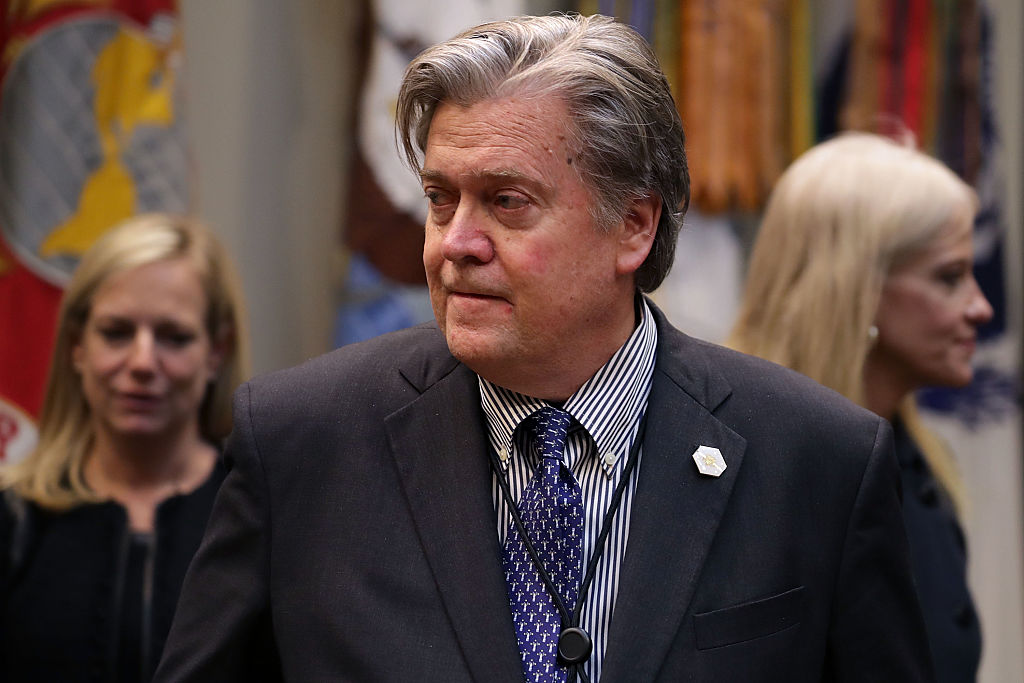White House chief strategist Steve Bannon has faded from the public view over the last few weeks as the Trump administration continues to deal with fallout from President Trump’s abrupt decision to fire FBI director James Comey.
Bannon was a prominent behind-the-scenes voice during the election and the presidential transition period. But after a number of policy blunders like the immigration order and Obamacare replacement bill, and ideological spats with Trump’s son-in-law Jared Kushner, it seemed Bannon may be on his last legs in the White House.
That may change following new revelations around the president’s and his associates’ ties to Russia, as well as what critics characterize as the president’s attempts to impede an active FBI investigation into the Trump campaign’s potential collusion with Russia during the 2016 election.
Bannon, known for his nationalist streak and combative style, has been described as a “wartime consigliere” and an avowed enemy of the “deep state,” Democrats, and investigators, Axios reported on Friday.
And the Trump-Russia controversy may just be his time to shine.
"Steve is super savvy dealing with the media and dealing with crises," Newsmax CEO and Trump confidant Christopher Ruddy told Axios.
Moreover, despite Bannon's widely-publicized squabbles with the centrist wing of the White House - which includes Kushner and chief of staff Reince Priebus - when it comes to managing crises, the three are able to find common ground against outside threats.
"It is now very clear that there is a unified opponent and that's ultimately the swamp, both with regard to the deep state leakers, to the partisan opponents and the people who just don't want to give up their power. That includes the media," one source close to the process told Axios.
"Obviously, you want [unity] under different circumstances but it's really united this team and helped bring clarity to their focus," the source added.

Bannon will also likely be an active voice in the president's rumored "war room," which Axios previously revealed. The goal of the initiative is reportedly to prepare for a potentially "years-long" fight with investigators and the bureaucracy. It willl serve as a way to prop up the president's legal and communications strategy as his administration continues to push back against mounting evidence that raises questions about the president's dealings with Russia.
The "war room" will focus on bringing on "experienced veterans from the campaign trail who recognize the gravity of the situation," a source told Axios.
The Trump administration has been roiled by controversy over the last few weeks, the most recent of which was the revelation that Kushner allegedly met with Russian ambassador Sergey Kislyak to discuss setting up a "backchannel" between the US and the Kremlin in order to bypass monitoring of their communications.
This latest bombshell is yet "another puzzle piece," said Keith Whittington, a professor politics at Princeton University. "It provides more reason to worry about the president's motivations when he made inquiries into the progress of [congressional and FBI] investigations."
Whittington added that it will also "presumably be harder for the president to distance himself from his son-in-law than it would be in the case of other staffers like Flynn," which will complicate the administration's efforts at damage control.
"The question isn't whether this line of communication was appropriate or not," said Jens David Ohlin, an associate dean at Cornell Law School and an expert on criminal law. "The question is why Kushner wanted it. Presumably the secret channel would allow the administration to talk to the Russians without the State Department, intelligence agencies, or the rest of the federal bureaucracy knowing about it. Why the need for secrecy from our own government?"
Ohlin suggested that recent developments may point to a "nefarious motive: a radical realignment of US-Russia relations in exchange for Russia intervening in the election to get Trump elected."
He continued: "I sincerely hope that isn't true because that would be profoundly disturbing."

